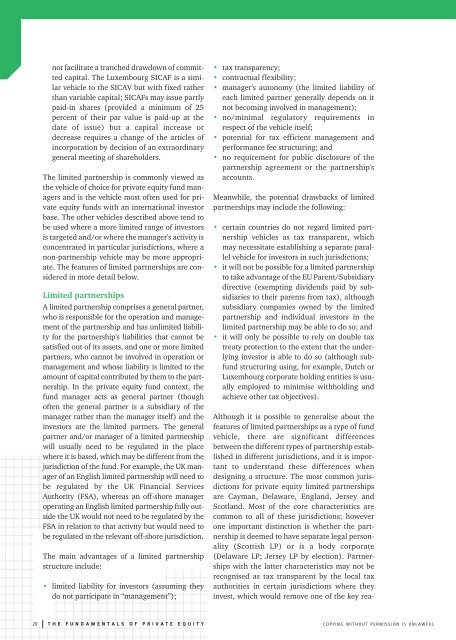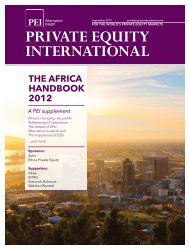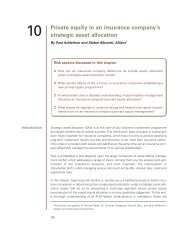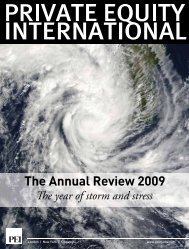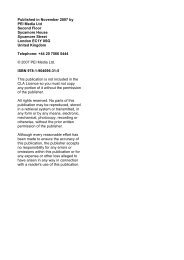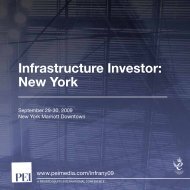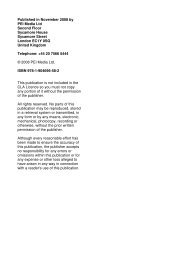Fundamentals of Private Equity and Venture Capital - PEI Media
Fundamentals of Private Equity and Venture Capital - PEI Media
Fundamentals of Private Equity and Venture Capital - PEI Media
Create successful ePaper yourself
Turn your PDF publications into a flip-book with our unique Google optimized e-Paper software.
not facilitate a tranched drawdown <strong>of</strong> committed<br />
capital. The Luxembourg SICAF is a similar<br />
vehicle to the SICAV but with fixed rather<br />
than variable capital; SICAFs may issue partly<br />
paid-in shares (provided a minimum <strong>of</strong> 25<br />
percent <strong>of</strong> their par value is paid-up at the<br />
date <strong>of</strong> issue) but a capital increase or<br />
decrease requires a change <strong>of</strong> the articles <strong>of</strong><br />
incorporation by decision <strong>of</strong> an extraordinary<br />
general meeting <strong>of</strong> shareholders.<br />
The limited partnership is commonly viewed as<br />
the vehicle <strong>of</strong> choice for private equity fund managers<br />
<strong>and</strong> is the vehicle most <strong>of</strong>ten used for private<br />
equity funds with an international investor<br />
base. The other vehicles described above tend to<br />
be used where a more limited range <strong>of</strong> investors<br />
is targeted <strong>and</strong>/or where the manager's activity is<br />
concentrated in particular jurisdictions, where a<br />
non-partnership vehicle may be more appropriate.<br />
The features <strong>of</strong> limited partnerships are considered<br />
in more detail below.<br />
Limited partnerships<br />
A limited partnership comprises a general partner,<br />
who is responsible for the operation <strong>and</strong> management<br />
<strong>of</strong> the partnership <strong>and</strong> has unlimited liability<br />
for the partnership's liabilities that cannot be<br />
satisfied out <strong>of</strong> its assets, <strong>and</strong> one or more limited<br />
partners, who cannot be involved in operation or<br />
management <strong>and</strong> whose liability is limited to the<br />
amount <strong>of</strong> capital contributed by them to the partnership.<br />
In the private equity fund context, the<br />
fund manager acts as general partner (though<br />
<strong>of</strong>ten the general partner is a subsidiary <strong>of</strong> the<br />
manager rather than the manager itself) <strong>and</strong> the<br />
investors are the limited partners. The general<br />
partner <strong>and</strong>/or manager <strong>of</strong> a limited partnership<br />
will usually need to be regulated in the place<br />
where it is based, which may be different from the<br />
jurisdiction <strong>of</strong> the fund. For example, the UK manager<br />
<strong>of</strong> an English limited partnership will need to<br />
be regulated by the UK Financial Services<br />
Authority (FSA), whereas an <strong>of</strong>f-shore manager<br />
operating an English limited partnership fully outside<br />
the UK would not need to be regulated by the<br />
FSA in relation to that activity but would need to<br />
be regulated in the relevant <strong>of</strong>f-shore jurisdiction.<br />
The main advantages <strong>of</strong> a limited partnership<br />
structure include:<br />
• limited liability for investors (assuming they<br />
do not participate in “management”);<br />
• tax transparency;<br />
• contractual flexibility;<br />
• manager's autonomy (the limited liability <strong>of</strong><br />
each limited partner generally depends on it<br />
not becoming involved in management);<br />
• no/minimal regulatory requirements in<br />
respect <strong>of</strong> the vehicle itself;<br />
• potential for tax efficient management <strong>and</strong><br />
performance fee structuring; <strong>and</strong><br />
• no requirement for public disclosure <strong>of</strong> the<br />
partnership agreement or the partnership's<br />
accounts.<br />
Meanwhile, the potential drawbacks <strong>of</strong> limited<br />
partnerships may include the following:<br />
• certain countries do not regard limited partnership<br />
vehicles as tax transparent, which<br />
may necessitate establishing a separate parallel<br />
vehicle for investors in such jurisdictions;<br />
• it will not be possible for a limited partnership<br />
to take advantage <strong>of</strong> the EU Parent/Subsidiary<br />
directive (exempting dividends paid by subsidiaries<br />
to their parents from tax), although<br />
subsidiary companies owned by the limited<br />
partnership <strong>and</strong> individual investors in the<br />
limited partnership may be able to do so; <strong>and</strong><br />
• it will only be possible to rely on double tax<br />
treaty protection to the extent that the underlying<br />
investor is able to do so (although subfund<br />
structuring using, for example, Dutch or<br />
Luxembourg corporate holding entities is usually<br />
employed to minimise withholding <strong>and</strong><br />
achieve other tax objectives).<br />
Although it is possible to generalise about the<br />
features <strong>of</strong> limited partnerships as a type <strong>of</strong> fund<br />
vehicle, there are significant differences<br />
between the different types <strong>of</strong> partnership established<br />
in different jurisdictions, <strong>and</strong> it is important<br />
to underst<strong>and</strong> these differences when<br />
designing a structure. The most common jurisdictions<br />
for private equity limited partnerships<br />
are Cayman, Delaware, Engl<strong>and</strong>, Jersey <strong>and</strong><br />
Scotl<strong>and</strong>. Most <strong>of</strong> the core characteristics are<br />
common to all <strong>of</strong> these jurisdictions; however<br />
one important distinction is whether the partnership<br />
is deemed to have separate legal personality<br />
(Scottish LP) or is a body corporate<br />
(Delaware LP; Jersey LP by election). Partnerships<br />
with the latter characteristics may not be<br />
recognised as tax transparent by the local tax<br />
authorities in certain jurisdictions where they<br />
invest, which would remove one <strong>of</strong> the key rea-<br />
20 THE FUNDAMENTALS OF PRIVATE EQUITY<br />
COPYING WITHOUT PERMISSION IS UNLAWFUL


